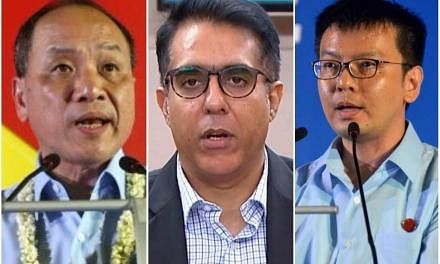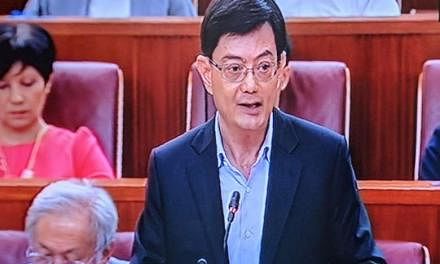SINGAPORE - The marathon eight-day Budget debate ended last Thursday. It was notable for a few landmarks.
First, MPs filed 530 "cuts" - or questions - for the 16 ministries, and were allocated 52 hours to deliver them, the longest over the past five years. This is a sign of the "breadth and gravity" of the issues Singapore faces, said Leader of the House Grace Fu, when she summed up the debate.
Second, the Workers' Party (WP) voted against the Budget statement for the first time in more than 30 years. The WP clashed with the Government on numerous occasions during the debate over the issue of the goods and services tax (GST), which is due to go up from 7 per cent to 9 per cent some time from 2021 to 2025.
This week's Insight looks back at the Budget debate and asks observers three questions you may have about the proceedings.
1. What was the key theme that emerged from the debate?
Analysts agree that the Budget sought to prepare Singapore for the long haul. This central theme made its mark in at least three areas: economic policy, social policy and fiscal policy.
In economics, the Budget tried to position Singapore to benefit from the shift in the economic centre of gravity from the West to Asia - with the setting up of an infrastructure office and measures to promote innovation and internationalisation among firms.
The Budget also had a clear social policy vision, said Professor Paul Cheung of the National University of Singapore. "I don't think the public realises the costs involved in building a 'caring infrastructure'," he added, referring to the funding of the care sector, which the Government said will rise steeply in the next decade due to the ageing population.
Fiscal sustainability - the third area with a long term focus - was where the most heated discussions took place, as MPs debated the GST hikes. But observers said the cut and thrust between the WP and the Government, while lively, lacked depth - since it focused on relatively minor issues, like whether the Government intended to raise taxes this year or later.
Said former People's Action Party MP Inderjit Singh:"I would have liked to see the Government spend time explaining the funding gap it was expecting in the future."
This gap is the reason a tax hike is needed. While the Government gave projections of the size of increase in spending on healthcare, security, education and other priorities, it did not show in detail during the debate by how much revenue would likely lag expenditure.
2. How did the fourth-generation of leaders from both sides perform?
The Budget debate was both a difficult test for the fourth-generation political leaders, as well as a chance for them to show their mettle and ability. This was so for leaders from both the PAP and the WP.
On the PAP side, the spotlight was on Finance Minister Heng Swee Keat, who is one of the three frontrunners to become the next prime minister. The Budget was his show.
He received the endorsement of former prime minister Goh Chok Tong, who showed Mr Heng the thumbs up when their eyes met in the House after Mr Heng finished his Budget round-up speech.
Analysts agreed he did well.
Political observer Mustafa Izzuddin said that he showed he was "firmly in the zone", in the way he defended the Budget.
He also seemed to be more proactive in how he confronted the opposition - compared to before his 2016 stroke, when he was more reserved and polite, observed Associate Professor Tan Khee Giap, of the Lee Kuan Yew School of Public Policy.
Mr Heng came through as a reasonable person and would have gained confidence from the public as competent, said former PAP MP Hong Hai. But whether in the days ahead he will be judged "as a leader with the charisma and leadership qualities to be PM remains to be seen", he added.
On the WP side, WP assistant secretary-general Pritam Singh is widely expected to lead the party following party elections a month from now, with WP chief Low Thia Khiang due to step down.
Mr Singh made the first WP speech during the debate, laying down the party's position of not supporting the GST hike. But in subsequent exchanges, he appeared to refrain from engaging robustly with PAP leaders, leaving the heavy lifting to party chairman Sylvia Lim, observers said.
Dr Felix Tan of SIM Global Education said Mr Singh was a little cautious, but measured.
The Aljunied GRC MP is earnest, added observer Devadas Krishnadas of the Future-Moves Group, but his lack of experience in either government or industry has bred a "theoretical" approach to policy issues.
Added Prof Hong: "Pritam has yet to attain the skills of cut and thrust which Sylvia Lim and Low Thia Khiang have demonstrated. He needs to learn fast."
3. Why did parliamentary privilege become an issue?
An unexpected issue that became the talk of the town during the Budget debate was parliamentary privilege.
During an exchange with Mr Heng, Ms Lim said she suspected the Government initially intended to raise GST this year, and floated a "test balloon" to gauge sentiment, but backtracked after the public reacted negatively.
The Government insisted that she retract her comment and apologise, arguing that she had no basis for making the accusation, which it said suggested that PAP ministers were dishonest.
When she refused, Leader of the House Grace Fu - after taking advice from the Attorney-General's Chambers - accused her of abusing her parliamentary privilege. She said that if Ms Lim repeated her conduct, she would be referred to Parliament's Committee of Privileges, which can probe abuses of privilege and recommend punishment.
Parliamentary privilege allows MPs to speak freely in Parliament without the risk of being sued in a court of law.
However, as its name suggests, is a privilege and not an absolute right. It can be withdrawn, and the Speaker of the House has some discretion over where the limits are, said Dr Felix Tan. Parliament holds the final power to rule on abuses, acting upon the recommendations of the Committee of Privileges.
But where a comment crosses the line into abuse is a "grey area", said Dr Tan.
The late British constitutional theorist Erskine May has noted that there are no clear lines on breaches of privilege. To list every act of contempt for Parliament would be in vain as the power to punish for contempt is, by nature, discretionary, he wrote.
Last Thursday, Ms Fu made the Singapore Parliament's position more explicit, saying MPs are "not entitled to make unsubstantiated allegations without taking steps to check the facts or knowingly maintain the allegations that have been shown to have no factual basis".











